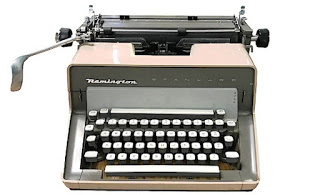
Typewriter and funny typographical mistakes…..
Typewriter and funny typographical mistakes…..
Despite using the typewriter for 25 years, followed by the use of key-board with the invention of computer, I never knew about the long history of typewriter and its brands beyond Remington and Godrej but after viewing the movie – Typewriter – by Sujoy Ghosh, during my recent visit to Singapore over Netflix. The story goes like that a haunted house and old book stir the imaginations of young aspirant ghost hunters, but when a new family move to town, the home’s buried secrets resurface.
Anyhow, keeping aside the ghost existence or non-existence, it created a curiosity for me to know more about the history of typewriter and some related memories.
Thanks to the Google search engines, which helped otherwise such things would have been confined to the libraries only, where the visits are restricted on need basis, in this high tech-era.
To learn typing had created interest in me in late 60s along with the Pitman’s shorthand which later on became my profession regardless of my passing out in Mechanical Diploma in those days.
A sentence which uses every letter of the alphabet – after learning the three basic lines lessons of the latest model of a typewriter – was “A quick brown fox jumps over the lazy dog” to check typewriters quickly.
The invention of the typewriter was one of the greatest turning points in history. Writing – previously a laborious task, was made immensely easier. The typewriter benefited countless clergymen, editors, and writers who were all “obliged to undergo the drudgery of the pen.” It brought convenience and productivity to people everywhere.
Despite the difficulty, writing was an integral part of human progression. By the mid-1400s, people had already gotten tired of writing’s difficulty and looked for new ways to reduce this labor.
The next major revolution in writing came in 1657 in the form of William Petty’s writing machine. In the machine’s patent, Charles I described it as a machine that:
Invented in 1829, William Austin Burt’s Typographer became the first American writing machine.
In 1831, another notable typewriter emerged, born in a time of much tension between the North and the South. Originally built as a hobby by John Pratt, the “Pterotype” would eventually become the inspiration for the first commercially successful typewriter.
The authors and writers who had notable relationships with typewriters were Henry James who dictated to a typist and Mark Twain claimed in his autobiography that he was the first important writer to present a publisher with a typewritten manuscript.
Frankly speaking, even after retirement, typewriter – now keyboard of laptop or desktop has become my 24×7 companion to pass time and do some creative work by writing blogs, middles for newspapers and of course, instant news for the online portals.
But two incidents related to wrong typing, which totally changed the concept of the script at the receiving end are memorable. One, a typist in the Secretariat has to face the music of his immediate boss when a letter to be addressed to Chief Engineer was inadvertently typed as Thief Engineer, which too pointed out from the receiving end. Second one, when a letter for a meeting rescheduled was floated as ‘not’ instead of ‘now’ – the meeting will not be held on September 1.



